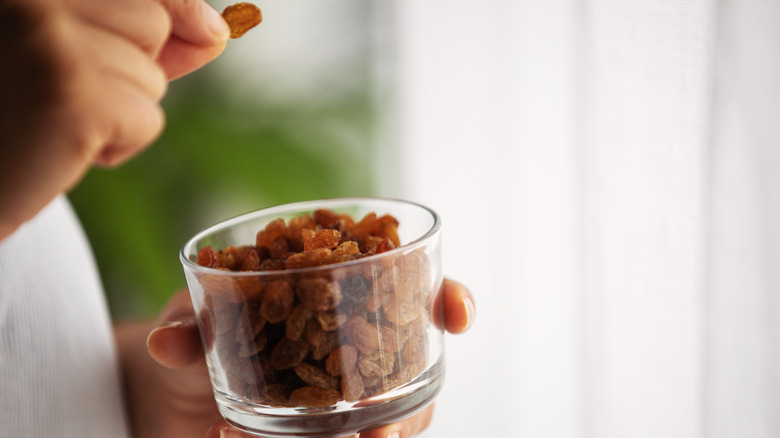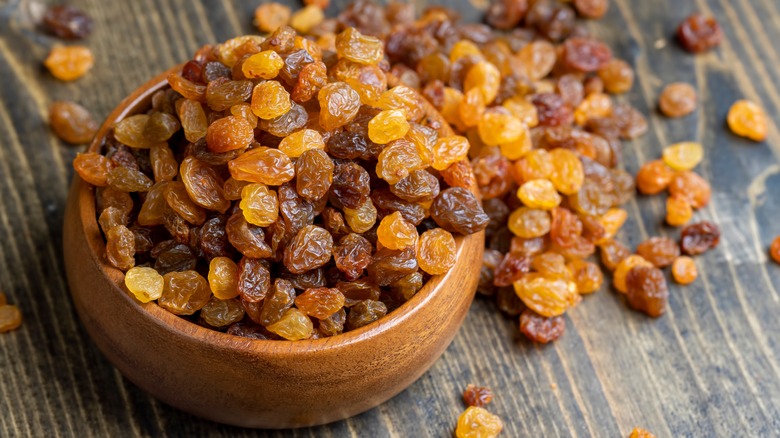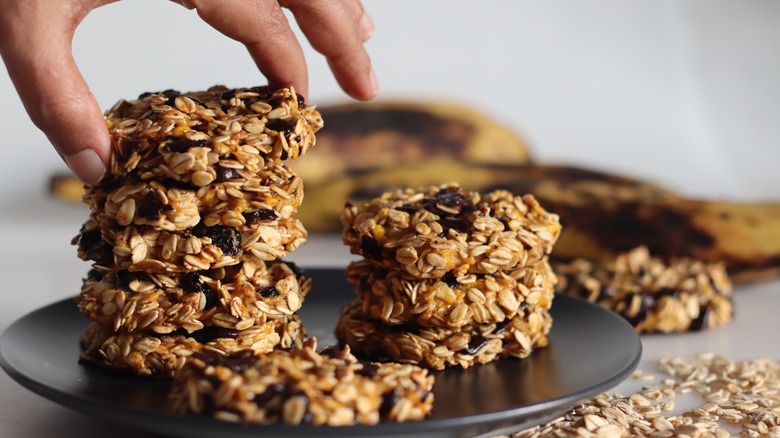The Raisin Energy Facts You Definitely Need To Know
Need a quick energy boost before hitting the gym? You might want to reach for a handful of raisins. These tiny fruits are rich in fast-digesting carbs, making them ideal for cyclists, swimmers, and other endurance athletes. An ounce provides around 22 grams of carbohydrates, including 18½ grams of natural sugars and 1⅓ grams of fiber. "These types of carbs digest and absorb quickly, causing a rise in blood sugar, and make glucose available to the muscles for performance," sports dietician Emilie Burgess told Byrdie.
Similarly, the National Academy of Sports Medicine (NASM) recommends eating high-carb foods before, during, and after exercise. The humble raisin can be a good choice, depending on your health and fitness goals. Be mindful that sugar is sugar no matter where it comes from; too much can do more harm than good. Raisins, or dried grapes, contain about 60% sugar in the form of fructose and glucose, so it's best to enjoy them in moderation.
Raisins can make a healthy pre-workout snack
Raisins are so beneficial for runners and other athletes because of their nutritional value. Health experts recommend getting our nutrients from food rather than supplements. While the latter can fill gaps in your diet, they may contain too many or too few specific vitamins and minerals, plus added sugar, artificial flavors, and all sorts of additives.
As mentioned, endurance athletes can benefit from simple sugars, or fast-acting carbs, before and after exercise. From this perspective, both raisins and sports supplements, such as energy bars can be a great choice, but the former has some distinct benefits. For starters, raisins are natural and contain no chemicals. Plus, they're rich in fiber, antioxidants, prebiotics, and other compounds that support heart health and colon function, according to 2020 research published in the journal Nutrients.
Your body cannot digest the fiber in raisins and other foods, but this nutrient has its role. Depending on its type (soluble or insoluble), it either absorbs water or forms a gel-like substance in the stomach. As a result, it slows down digestion — and sugar absorption into the bloodstream. This causes a gradual increase in insulin levels, preventing blood sugar spikes followed by crashes. Simply put, raisins provide steady energy, not just a quick sugar rush.
Add raisins to your diet for higher energy and stamina
Raisins are delicious on their own, but some people find them too sweet or chewy. Plus, they're not particularly filling. What you could do is incorporate them into your pre-workout snacks to keep things varied and get full faster. Start with apple oatmeal chocolate protein bars, which take just 10 minutes to prepare. Simply add a handful of raisins to the batter before you freeze it. Similarly, raisins can be a nutritious addition to energy bites, trail mixes, or protein bars. Mix them with peanut butter, ground flaxseeds, cinnamon, and other ingredients to make a batch of energy balls.
Here's another idea: Spread almond or peanut butter on rice cakes and top with raisins. For a creamy dessert, mix raisins into chia pudding or Greek yogurt. Alternatively, serve them with cottage cheese or blend them into smoothies. You can also use raisins as a substitute for sugar in homemade desserts.
Remember that moderation is key. Due to their high fiber content, raisins can cause bloating, gas, and diarrhea when consumed in excess. They also contain sorbitol, a sugar alcohol that can upset your stomach. Both sorbitol and fiber may help prevent or relieve constipation — just make sure you don't go overboard. A serving of raisins (1-1½ ounces) is unlikely to have side effects.


